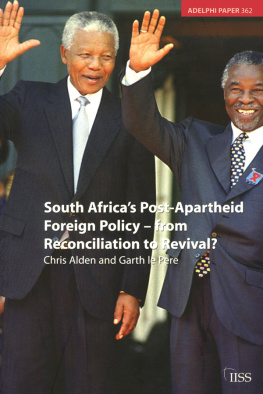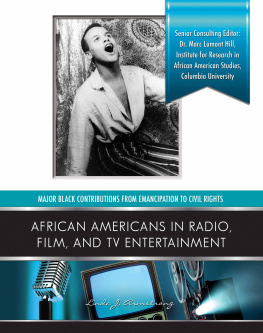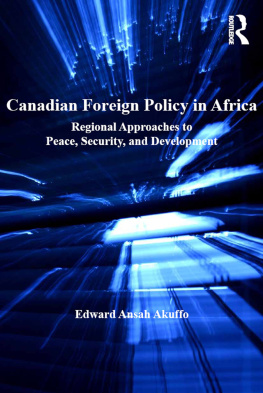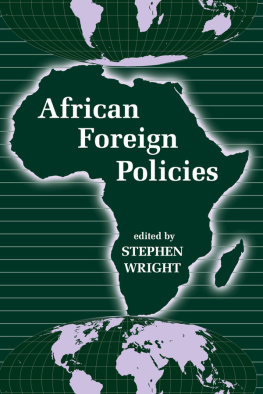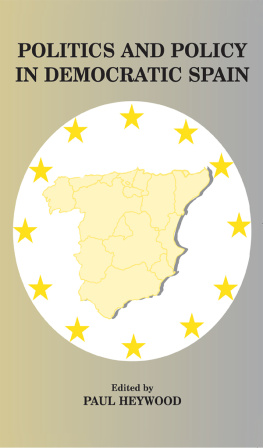African Americans in U.S. Foreign Policy
African Americans in U.S. Foreign Policy
From the Era of Frederick Douglass to the Age of Obama
Edited by Linda Heywood, Allison Blakely, Charles Stith, and Joshua C. Yesnowitz
University of Illinois Press
Urbana, Chicago, and Springfield
2015 by the Board of Trustees
of the University of Illinois
All rights reserved
Manufactured in the United States of America
1 2 3 4 5 C P 5 4 3 2 1

This book is printed on acid-free paper.
Library of Congress Cataloging-in-Publication Data African Americans in U.S. foreign policy : from the era of Frederick Douglass to the age of Obama / edited by Linda Heywood, Allison Blakely, Charles Stith, and Joshua C. Yesnowitz.
pages cm
Includes bibliographical references and index.
ISBN 978-0-252-03887-7 (hardback)
ISBN 978-0-252-08041-8 (paperback)
ISBN 978-0-252-09683-9 (e-book)
1. United StatesForeign relations20th centuryCitizen participation. 2. United StatesForeign relations20th centurySocial aspects. 3. African AmericansPolitics and government20th century. 4. United StatesRace relationsPolitical aspects. 5. RacismPolitical aspectsUnited StatesHistory20th century. 6. African AmericansCivil rightsHistory20th century.
I. Heywood, Linda M. (Linda Marinda), 1945
II. Blakely, Allison, 1940
III. Stith, Charles R. IV. Yesnowitz, Joshua C.
E744.A295 2015
323.1196073dc23 2014023259
Acknowledgments
This volume originated in the conference African Americans and U.S. Foreign Policy held at Boston University on October 2628, 2010. The conference included addresses by Johnnie Carson, U.S. assistant secretary of state, and Jendayi Frazer, former U.S. assistant secretary of state, and was attended by more than 350 scholars, former diplomats, State Department officials, students, and members of the general public. We would like to acknowledge the support of the African American Studies Program and the African Presidential Archives and Research Center at Boston University, which co-sponsored the conference. The conference and this collection of essays would not have been possible without the financial support of the Boston University Humanities Foundation, the George and Joyce Wein Fund at Boston University, Blue Cross Blue Shield of Massachusetts, Savings Bank Life Insurance, TD Bank, and USAID.
Preface
Reflections of a Black Ambassador
WALTER C. CARRINGTON
It was not the lure of liberty but rather its loss that brought enslaved Africans to Americas shores. Others, who originally came from Europe and later from all corners of the earth, could look forward in hope, but those who came in chains faced nothing but desolation. In the words of the old spiritual, they felt like a motherless child, a long ways from home. They dreamed of escaping from this hostile land. Many of them, during their captors War of Independence, repaired to the banner of the Union Jack when agents of George the Third promised them freedom. Although the British lost the war, many Loyalist blacks claimed that freedom and escaped to Canada and from there returned to Africa. Those less fortunate were condemned to live in slavery in the U.S. South or segregation in the North. At times of deepest despair over their future in America, many blacks followed those who argued, as did Martin Delany, that Africans in America were a broken nation and could be made whole again only by separating from their white oppressors.
Unwelcome in white churches, blacks formed their own denominations and often christened them African. Early on, these new black churches saw their relationship with Africa primarily in terms of helping to Christianize their heathen brethren in Africa; by the late nineteenth century, however, black churches began to champion the grievances Africans held against their colonial exploitation. American blacks took the lead in protesting Belgian atrocities in the Congo and British and French designs on Liberia. Along with blacks in other parts of the diaspora, they formed the Pan-African movement and saved the German colonies from being swallowed up by the victorious Allied powers at the end of the First World War. Americas black colleges educated generations of African leaders, from the founders of the African National Congress to the first heads of state of Ghana, Malawi, and Nigeria. Later blacks moved the American government away from complicity with the apartheid regime in South Africa and toward greater relief to the drought-stricken Sahel and Horn regions. The impetus toward an African identification that had been elite-driven in the nineteenth century had become, by the end of the twentieth, increasingly sparked by the rank and file.
Much of black agitation for a role in the formation of foreign affairs, especially as it affected the Motherland, in the words of Countee Cullen, from whose loins he and his ancestors sprang, coalesced around the doctrine of Pan-Africanism. A West Indian barrister, Henry Sylvester Williams, coined the term Pan-African at a 1900 conference on Africa. A thirty-two-year-old William Edward Burghardt Du Bois incorporated it into the conference report and later transformed it into the centurys most enduring anthem of a continents liberation and a races redemption. Du Bois foresaw in the fall of the kaiser at the end of the First World War a unique advantage to Africa. He persuaded the National Association for the Advancement of Colored People (NAACP) to send him as an observer to the Paris Peace Conference at Versailles. There, with the assistance of Blaise Diagne, the Senegalese member of the French parliament, he called the first Pan-African Conference. Its goal was to influence the Versailles deliberations, and to that end the group submitted eleven resolutions to the Paris Peace Conference.
Most of the demands on behalf of African nationalism fared no better with the victorious Allies than those made in the name of Kurdish or Armenian nationalism. The one exception concerned the fate of the former German colonies. Du Bois and his fellow Pan-Africanists urged that they not be transferred to other colonial powers but instead be placed under international control until their inhabitants could determine their own future. This led to the establishment of the Mandates Commission, under which the League of Nations and later the United Nations Trusteeship Council kept South West Africa (now Namibia) from being formally incorporated into South Africa. While, as chronicled in chapter 1 of this volume, more than sixty African Americans were appointed to diplomatic, consular, or commercial agency positions during the period from the Civil War to the 1920s, their formal participation in foreign policy dates from later in the twentieth century and included great attention to Africa.
Marcus Garvey and the Raising of Mass Consciousness
The Pan-African movement united black intellectuals in the Americas and Africa but left the masses of blacks in the diaspora largely unmoved. While the Pan-Africanists were convening in various European capitals, the condition of the Negro in the United States was deteriorating. Once again, blacks were beginning to despair that they could never hope to live in dignity and security in white America.


 This book is printed on acid-free paper.
This book is printed on acid-free paper.
